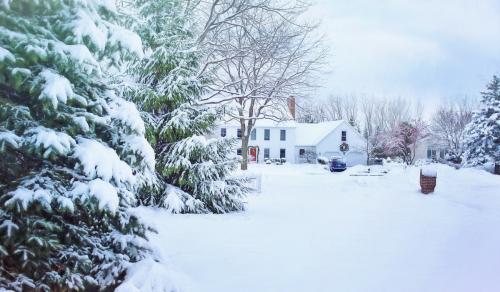9 Ways to Prevent Water Damage During Winter Months

With freezing temperatures and severe weather that can result in various problems, including water damage, the winter months can be tough on homes and buildings. Ice dams forming on roofs, frozen pipes bursting, and melting snow seeping into the home are just a few ways water damage can happen during the winter. Here are nine ways to guard against water damage this winter.
Clean Gutters & Downspouts
To ensure that water can flow freely, keeping your gutters and downspouts clean is critical. Water can back up and overflow in gutters clogged with leaves, twigs, and other debris, harming the roof and walls. Moreover, ice dams resulting from water freezing in clogged gutters can harm the roof and leak.
Insulate Your Pipes
Insulating your pipes can be effectively kept from freezing during the winter. Pipes that freeze and burst can cause significant water damage. Heat tape or foam insulation sleeves can be used to insulate pipes, keeping them warm and preventing freezing.
Seal Windows & Doors
Sealing your doors and windows can help stop water damage from melted snow and ice seeping into your house. If you see any gaps or cracks in your doors or windows, weatherstripping or caulk can seal them and keep moisture and cold air out of your house.
Upkeep Your Heating System
Maintaining your heating system is essential to avoiding frozen pipes and other water damage. To ensure that your heating system is operating effectively, check that your furnace is functioning correctly and replace air filters regularly. Additionally, it's a good idea to have a professional check your heating system before the start of winter to find and fix any potential issues.
Maintain a Warm Home
Pipes can avoid freezing and bursting by staying warm in your home. Ensure your house is adequately insulated and keeps its temperature steady all winter. Set your thermostat to at least 55 degrees in the winter if you anticipate being away from home for a long time to avoid pipes freezing.
Disconnect Your Garden Hoses
Garden hoses can avoid freezing and bursting by being disconnected from outdoor faucets. During the winter, water in garden hoses still attached to outdoor faucets may freeze and burst the faucet.
Check Your Water Bill
You can spot leaks and other water damage early on by monitoring your water bill. A professional should inspect your plumbing system if you notice an unexpected rise in your water bill, which could indicate a leak.
Get a Sump Pump Installed
Installing a sump pump in your basement can help stop water damage from melting snow and ice. A sump pump can remove your basement's excess water before it causes damage. Ensure your sump pump functions correctly.
Set up a Plan
Having a plan in place can help you. Ensure everyone in your home knows how to turn off the water supply and where to find the main shut-off valve. Keep different contacts saved, such as a siding contractor in Denver or a professional water damage restoration company's phone number close at hand.
Potential Damage to Avoid
Frozen pipes
Frozen pipes that can burst and cause flooding are one of the significant wintertime causes of water damage. Insulate any pipes and faucets exposed to colder temperatures to avoid this. Heat tape or foam insulation are both suitable for this.
Icy Dams
Another frequent reason for water damage in the winter is ice dams. A dam forms when the snow thaws on your roof, then refreeze at the edge of the roof, preventing water from draining properly. The water may then seep inside your house, damaging the insulation, walls, and ceilings. As soon as the snow on your roof has been cleared, insulate, and ventilate your attic correctly to prevent the formation of ice dams.
Condensation
Condensation can also result in water damage during the winter. The moisture in the air condenses into water droplets when warm air meets a cold surface, such as a wall or window. Over time, this can result in growth, rotting wood, and further kinds of water damage. Ensure your home is adequately ventilated and maintained at low humidity levels to avoid condensation.
What to Do if You Have Water Damage During the Winter
Despite your best efforts, water damage might still happen during the winter. Acting quickly if your home sustains water damage is critical to limit further damage and the risk of mold growth. If your property sustains water damage, follow these steps:
Disconnect the water supply
Immediately turn off the water supply to stop additional flooding if a pipe bursts.
Make an appointment with a specialist
Repairing water damage can be challenging, mainly if it has spread to several rooms in your house. Contact a reputable water damage restoration business to evaluate the damage and start the clean-up process.
Dry out moisture and water
Use fans to move air and dry out the affected areas while using a wet/dry vacuum to remove any standing water.
Conclusion
Winter maintenance and preparation are essential to preventing water damage. Cleaning gutters and downspouts, insulating pipes, caulking doors and windows, maintaining your heating system, keeping your home warm, disconnecting garden hoses, keeping an eye on your water bill, setting up a sump pump, and having a plan in place can all help prevent water damage brought on by freezing temperatures and severe weather conditions.
Post Your Ad Here
Comments